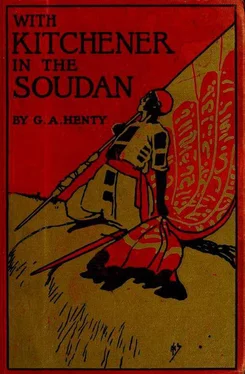The scene in the town was awful,—the stench overpowering! The Dervishes were absolutely ignorant of all sanitary methods,—pools of the foulest slush abounded, and thousands of dead animals in all stages of decomposition lay about the streets. Among them were numerous dead bodies, principally of girls and women who had been killed by their brutal husbands or masters to prevent them from falling into the hands of the British. There were also many dead Dervishes, and others desperately wounded. Strangely enough, the latter did not seem to regard their victorious enemy with the hate that had been exhibited by many of the wounded in the field, and some of them half-raised themselves and saluted the Sirdar and his staff as they passed along.
Presently there was a commotion in the crowd. The wall of the great granary had been breached by some of the lyddite shells, and the grain had poured out into the street. The natives near ran up to gather it, and finding that they were not molested by the British, the news spread rapidly; the crowds in the streets melted away, and the inhabitants, foi the most part half-starved, made a mad rush to the spot, where in a short time many thousands of men, women, and children were hard at work gathering and carrying off the grain.
In the meantime the Sirdar, with a party of Maxwell's brigade, passed along by the side of the great wall enclosing the buildings and square mile of ground in which were the Khalifa's house, the tomb of the Mahdi, the arsenal, storehouses, and the homes of the principal emirs. As soon as they had turned the corner of the wall, in view of the tomb and the Khalifa's house, a brisk fire was opened by the garrison. Fortunately the wall was not loopholed, and they had to get on the top of it or on to the flat roofs of the houses to fire. Maxwell's men soon silenced them, and on the troops passing in through the breaches and along the wall, most of the Dervishes at once surrendered. For a time further advance was barred by an inner wall that still intervened between them and the Khalifa's house.
After the gun-boats' fire had cleared away a number of the Dervishes clustered outside the south wall, the Sirdar and his staff entered by a gateway and moved towards the Khalifa's house. This was searched by Slatin Pasha and several officers and soldiers, but to the general disappointment it was found that the Khalifa had escaped but a short time before, carrying with him his treasure, his wives having been sent off as soon as he returned from the field of battle. The Mahdi's tomb was a ruin; a large portion of the dome had been knocked away, and the falling fragments had smashed the iron railings that surrounded the tomb itself. There was nothing more to be done. The pursuit of the Khalifa, mounted as he would be on fresh horses, was out of the question. It was already almost dark, and men and horses had been at work since before daybreak. The town was in a very disturbed state—large numbers of the Dervishes were still possessed of their arms, and the greater portion of the troops were withdrawn from the pestilential town. Next morning a larger force was marched in, and the work of disarmament completed.
The cavalry went out and scouted the country and brought in large numbers of prisoners. The men belonging to the tribes that had renounced Mahdism—Jaalin and others—were at once allowed to leave for their homes, and numbers of others whose appearance was peaceful, and who had at once given up their arms, were also released; but there were still no fewer than eleven thousand prisoners, among them pome of the Khalifa's emirs. Many of the townspeople had started the previous evening for the field of battle to bury the bodies of their friends who had fallen, and to bring in the wounded. Of the latter, after our own men had been attended to, fully nine thousand received aid and attention from the British doctors.
On the morning after the occupation, the work of purification began. Great numbers of the unwounded prisoners and of the townspeople were set to work to clean the streets, and in a couple of days the wider thoroughfares and avenues had been thoroughly cleansed. Having but little to do, Gregory went into the Khalifa's arsenal. This building was full of war material of all kinds, including a perfectly-appointed battery of Krupp guns, numbers of old cannon, modern machine-guns, rifles and pistols mixed up with musical instruments, suits of chain armour, steel helmets, hundreds of battle flags, and thousands of native spears, swords, and shields. Besides these the collection comprised ivory, percussion-caps, lead, copper, and bronze, looms, pianos, sewing-machines, boilers, steam-engines, agricultural implements, ostrich feathers, wooden and iron bedsteads, paints, india-rubber, leather water-bottles, clothes, three state-coaches, and an American buggy. There were also a modern smithy, where gunpowder, shell, bullets, and cartridge-cases were made and stored, and a well-appointed engineers' shop and foundry, with several steam-engines, turning-lathes, and other tools. The machinery had been brought from Gordon's arsenal at Khartoum, where the foreman had been employed, and the workmen were for the most part Greeks.
The battle was fought on Friday, the 2nd of September. On Sunday a flotilla of boats containing detachments from all the British and Egyptian regiments, and every officer who could be spared from duty, proceeded up the river to Khartoum. The ruined and deserted city looked delightful after the sand, dirt, and wretchedness of Omdurman. The gardens of the governor's house and other principal buildings had run wild, and the green foliage was restful indeed to the eye after the waste of sand, rock, and scrub that had been traversed by the army on its way from Wady Haifa. The vessels drew up opposite a grove of tall palms. Beyond them appeared what had been the government house. The upper story was gone, the windows were filled up with bricks, and a large acacia stood in front of the building.
The troops formed up before the palace in three sides of a square—the Egyptians were to the left looking from the river, and the British to the right,—the Sirdar and the generals of the divisions and brigades facing the centre. Two flagstaff's had been raised on the upper story. The Sirdar gave the signal, and the British and Egyptian flags were run up. As they flew out, one of the gun-boats fired a salute, the Guard?' band struck up "God Save the Queen!" and the band of the 11th Soudanese then played the Khedive's hymn, while the Generals and all present stood in salute with their hands to the peak of their helmets. The Sirdar's call for three cheers for the Queen was enthusiastically responded to, every helmet being raised. Similar cheers were then given for the Khedive, the bands again struck up, and twenty-one guns were fired.
As the last gun echoed out, the Guards played the Dead March in " Saul", and the black band the march called " Toll for the Brave ", the latter in memory of the Khedive's subjects who had died with Gordon. Then minute-guns were fired, and four chaplains—Anglican, Presbyterian, Methodist, and Catholic— by turns read a psalm or a prayer. The pipers then wailed a dirge, and finally the Soudanese bands played Gordon's favourite hymn, "Abide with me".
At the conclusion General Hunter and the other officers shook hands with the Sirdar one by one. Kitchener himself was deeply moved, and well he might be! Fourteen years of his life had been spent in preparing for and carrying out this campaign, and now the great task was done. Gordon wks avenged; of the Dervish host the remnant were scattered fugitives. The Mahdi's cause, the foulest and most blood-stained tyranny that had ever existed, transforming as it did a flourishing province into an almost uninhabited desert, was crushed for ever; and it was his patient and unsparing labour, his wonderful organization, that had been the main factor in the work. No wonder that even the Iron Sirdar almost broke down at such a moment.
Читать дальше












